Global Events Assignment
VerifiedAdded on 2021/02/19
|10
|3134
|29
AI Summary
Contribute Materials
Your contribution can guide someone’s learning journey. Share your
documents today.

Global Events
Secure Best Marks with AI Grader
Need help grading? Try our AI Grader for instant feedback on your assignments.
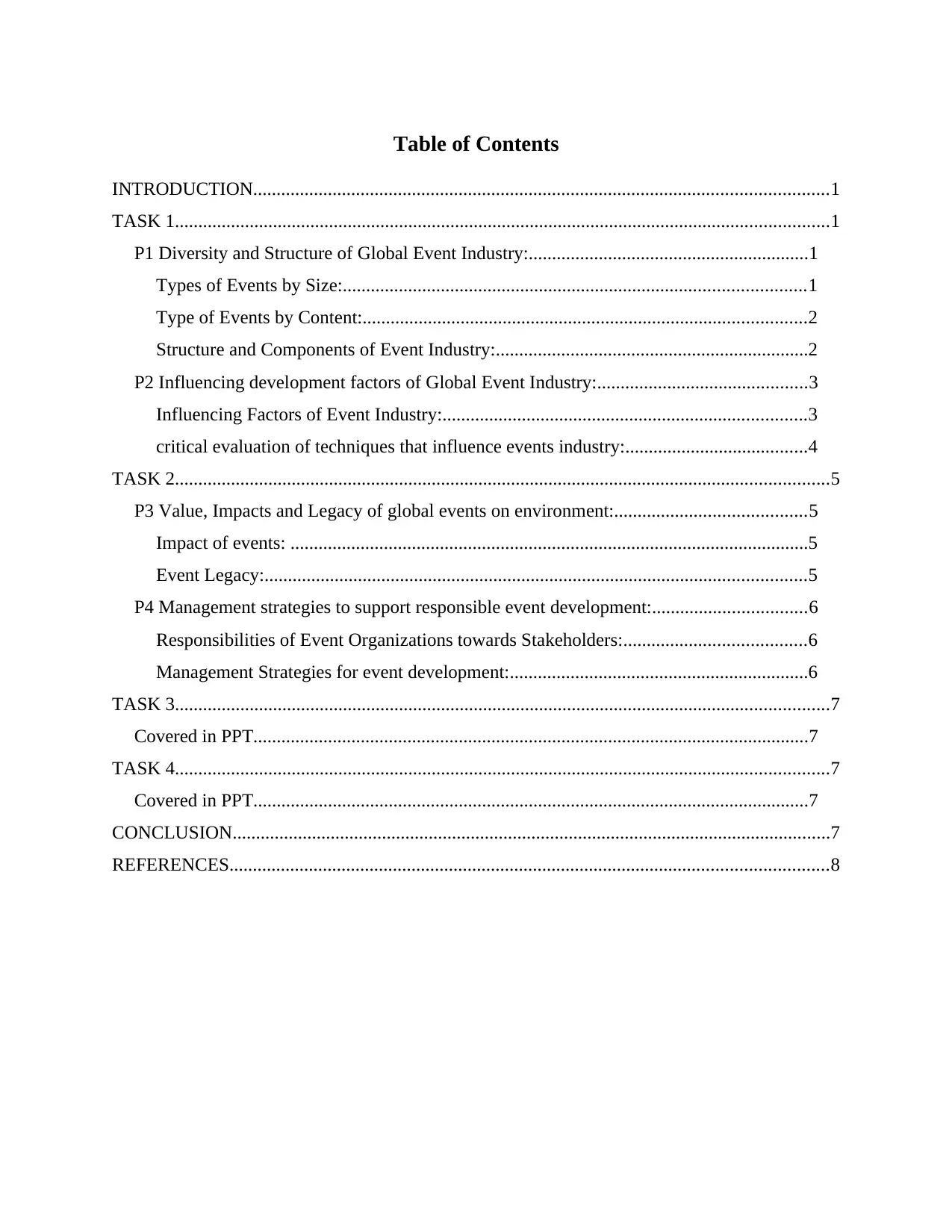
Table of Contents
INTRODUCTION...........................................................................................................................1
TASK 1............................................................................................................................................1
P1 Diversity and Structure of Global Event Industry:............................................................1
Types of Events by Size:...................................................................................................1
Type of Events by Content:...............................................................................................2
Structure and Components of Event Industry:...................................................................2
P2 Influencing development factors of Global Event Industry:.............................................3
Influencing Factors of Event Industry:..............................................................................3
critical evaluation of techniques that influence events industry:.......................................4
TASK 2............................................................................................................................................5
P3 Value, Impacts and Legacy of global events on environment:.........................................5
Impact of events: ...............................................................................................................5
Event Legacy:....................................................................................................................5
P4 Management strategies to support responsible event development:.................................6
Responsibilities of Event Organizations towards Stakeholders:.......................................6
Management Strategies for event development:................................................................6
TASK 3............................................................................................................................................7
Covered in PPT.......................................................................................................................7
TASK 4............................................................................................................................................7
Covered in PPT.......................................................................................................................7
CONCLUSION................................................................................................................................7
REFERENCES................................................................................................................................8
INTRODUCTION...........................................................................................................................1
TASK 1............................................................................................................................................1
P1 Diversity and Structure of Global Event Industry:............................................................1
Types of Events by Size:...................................................................................................1
Type of Events by Content:...............................................................................................2
Structure and Components of Event Industry:...................................................................2
P2 Influencing development factors of Global Event Industry:.............................................3
Influencing Factors of Event Industry:..............................................................................3
critical evaluation of techniques that influence events industry:.......................................4
TASK 2............................................................................................................................................5
P3 Value, Impacts and Legacy of global events on environment:.........................................5
Impact of events: ...............................................................................................................5
Event Legacy:....................................................................................................................5
P4 Management strategies to support responsible event development:.................................6
Responsibilities of Event Organizations towards Stakeholders:.......................................6
Management Strategies for event development:................................................................6
TASK 3............................................................................................................................................7
Covered in PPT.......................................................................................................................7
TASK 4............................................................................................................................................7
Covered in PPT.......................................................................................................................7
CONCLUSION................................................................................................................................7
REFERENCES................................................................................................................................8
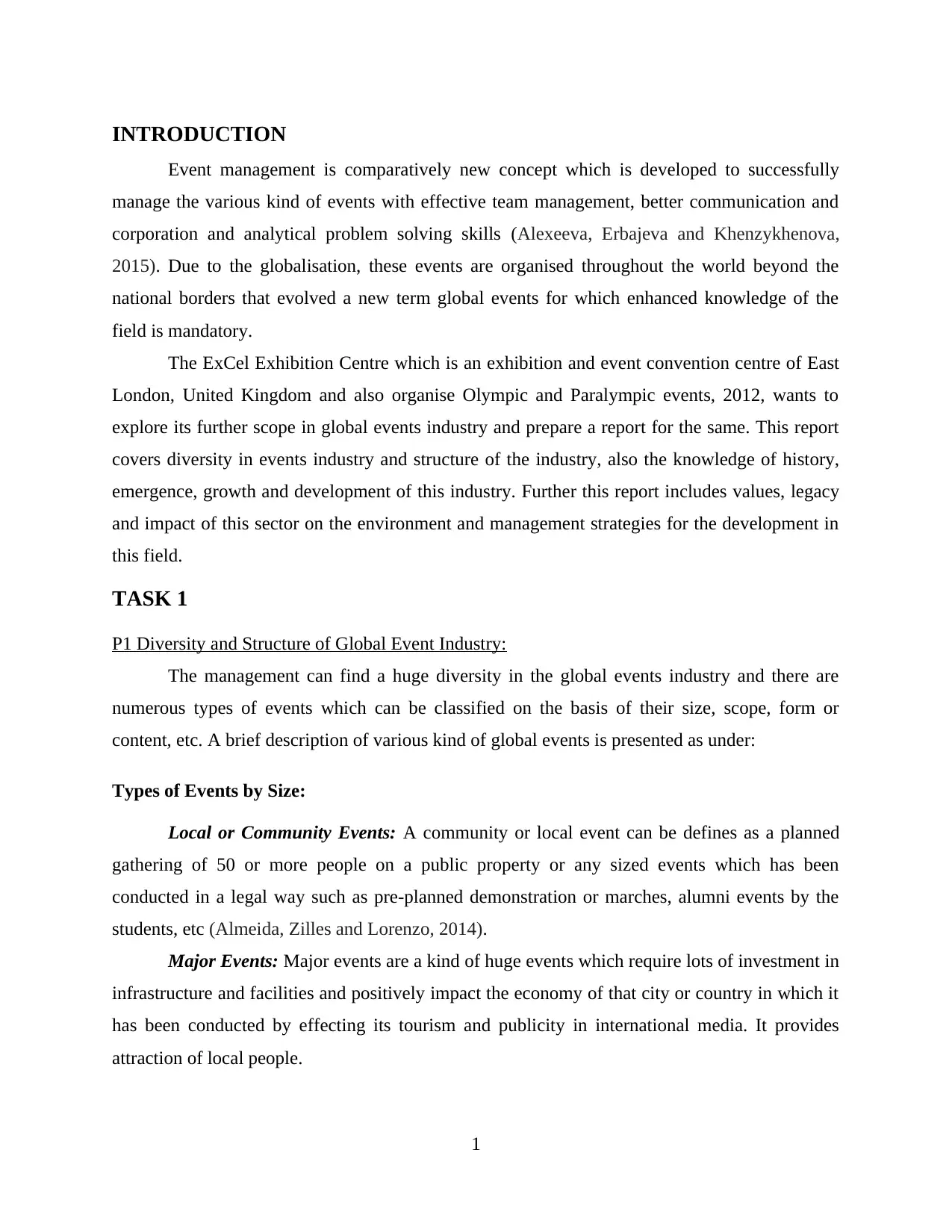
INTRODUCTION
Event management is comparatively new concept which is developed to successfully
manage the various kind of events with effective team management, better communication and
corporation and analytical problem solving skills (Alexeeva, Erbajeva and Khenzykhenova,
2015). Due to the globalisation, these events are organised throughout the world beyond the
national borders that evolved a new term global events for which enhanced knowledge of the
field is mandatory.
The ExCel Exhibition Centre which is an exhibition and event convention centre of East
London, United Kingdom and also organise Olympic and Paralympic events, 2012, wants to
explore its further scope in global events industry and prepare a report for the same. This report
covers diversity in events industry and structure of the industry, also the knowledge of history,
emergence, growth and development of this industry. Further this report includes values, legacy
and impact of this sector on the environment and management strategies for the development in
this field.
TASK 1
P1 Diversity and Structure of Global Event Industry:
The management can find a huge diversity in the global events industry and there are
numerous types of events which can be classified on the basis of their size, scope, form or
content, etc. A brief description of various kind of global events is presented as under:
Types of Events by Size:
Local or Community Events: A community or local event can be defines as a planned
gathering of 50 or more people on a public property or any sized events which has been
conducted in a legal way such as pre-planned demonstration or marches, alumni events by the
students, etc (Almeida, Zilles and Lorenzo, 2014).
Major Events: Major events are a kind of huge events which require lots of investment in
infrastructure and facilities and positively impact the economy of that city or country in which it
has been conducted by effecting its tourism and publicity in international media. It provides
attraction of local people.
1
Event management is comparatively new concept which is developed to successfully
manage the various kind of events with effective team management, better communication and
corporation and analytical problem solving skills (Alexeeva, Erbajeva and Khenzykhenova,
2015). Due to the globalisation, these events are organised throughout the world beyond the
national borders that evolved a new term global events for which enhanced knowledge of the
field is mandatory.
The ExCel Exhibition Centre which is an exhibition and event convention centre of East
London, United Kingdom and also organise Olympic and Paralympic events, 2012, wants to
explore its further scope in global events industry and prepare a report for the same. This report
covers diversity in events industry and structure of the industry, also the knowledge of history,
emergence, growth and development of this industry. Further this report includes values, legacy
and impact of this sector on the environment and management strategies for the development in
this field.
TASK 1
P1 Diversity and Structure of Global Event Industry:
The management can find a huge diversity in the global events industry and there are
numerous types of events which can be classified on the basis of their size, scope, form or
content, etc. A brief description of various kind of global events is presented as under:
Types of Events by Size:
Local or Community Events: A community or local event can be defines as a planned
gathering of 50 or more people on a public property or any sized events which has been
conducted in a legal way such as pre-planned demonstration or marches, alumni events by the
students, etc (Almeida, Zilles and Lorenzo, 2014).
Major Events: Major events are a kind of huge events which require lots of investment in
infrastructure and facilities and positively impact the economy of that city or country in which it
has been conducted by effecting its tourism and publicity in international media. It provides
attraction of local people.
1
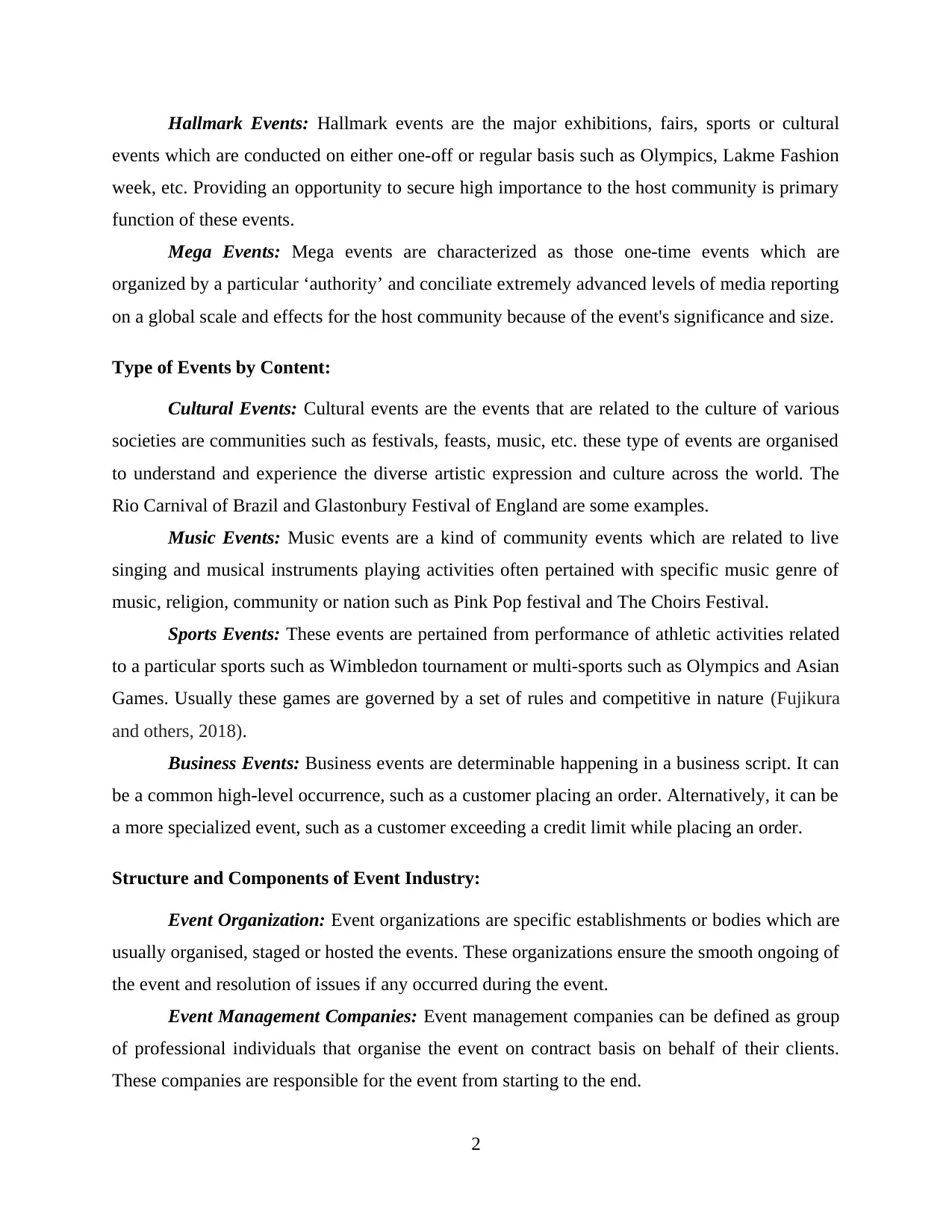
Hallmark Events: Hallmark events are the major exhibitions, fairs, sports or cultural
events which are conducted on either one-off or regular basis such as Olympics, Lakme Fashion
week, etc. Providing an opportunity to secure high importance to the host community is primary
function of these events.
Mega Events: Mega events are characterized as those one-time events which are
organized by a particular ‘authority’ and conciliate extremely advanced levels of media reporting
on a global scale and effects for the host community because of the event's significance and size.
Type of Events by Content:
Cultural Events: Cultural events are the events that are related to the culture of various
societies are communities such as festivals, feasts, music, etc. these type of events are organised
to understand and experience the diverse artistic expression and culture across the world. The
Rio Carnival of Brazil and Glastonbury Festival of England are some examples.
Music Events: Music events are a kind of community events which are related to live
singing and musical instruments playing activities often pertained with specific music genre of
music, religion, community or nation such as Pink Pop festival and The Choirs Festival.
Sports Events: These events are pertained from performance of athletic activities related
to a particular sports such as Wimbledon tournament or multi-sports such as Olympics and Asian
Games. Usually these games are governed by a set of rules and competitive in nature (Fujikura
and others, 2018).
Business Events: Business events are determinable happening in a business script. It can
be a common high-level occurrence, such as a customer placing an order. Alternatively, it can be
a more specialized event, such as a customer exceeding a credit limit while placing an order.
Structure and Components of Event Industry:
Event Organization: Event organizations are specific establishments or bodies which are
usually organised, staged or hosted the events. These organizations ensure the smooth ongoing of
the event and resolution of issues if any occurred during the event.
Event Management Companies: Event management companies can be defined as group
of professional individuals that organise the event on contract basis on behalf of their clients.
These companies are responsible for the event from starting to the end.
2
events which are conducted on either one-off or regular basis such as Olympics, Lakme Fashion
week, etc. Providing an opportunity to secure high importance to the host community is primary
function of these events.
Mega Events: Mega events are characterized as those one-time events which are
organized by a particular ‘authority’ and conciliate extremely advanced levels of media reporting
on a global scale and effects for the host community because of the event's significance and size.
Type of Events by Content:
Cultural Events: Cultural events are the events that are related to the culture of various
societies are communities such as festivals, feasts, music, etc. these type of events are organised
to understand and experience the diverse artistic expression and culture across the world. The
Rio Carnival of Brazil and Glastonbury Festival of England are some examples.
Music Events: Music events are a kind of community events which are related to live
singing and musical instruments playing activities often pertained with specific music genre of
music, religion, community or nation such as Pink Pop festival and The Choirs Festival.
Sports Events: These events are pertained from performance of athletic activities related
to a particular sports such as Wimbledon tournament or multi-sports such as Olympics and Asian
Games. Usually these games are governed by a set of rules and competitive in nature (Fujikura
and others, 2018).
Business Events: Business events are determinable happening in a business script. It can
be a common high-level occurrence, such as a customer placing an order. Alternatively, it can be
a more specialized event, such as a customer exceeding a credit limit while placing an order.
Structure and Components of Event Industry:
Event Organization: Event organizations are specific establishments or bodies which are
usually organised, staged or hosted the events. These organizations ensure the smooth ongoing of
the event and resolution of issues if any occurred during the event.
Event Management Companies: Event management companies can be defined as group
of professional individuals that organise the event on contract basis on behalf of their clients.
These companies are responsible for the event from starting to the end.
2
Secure Best Marks with AI Grader
Need help grading? Try our AI Grader for instant feedback on your assignments.
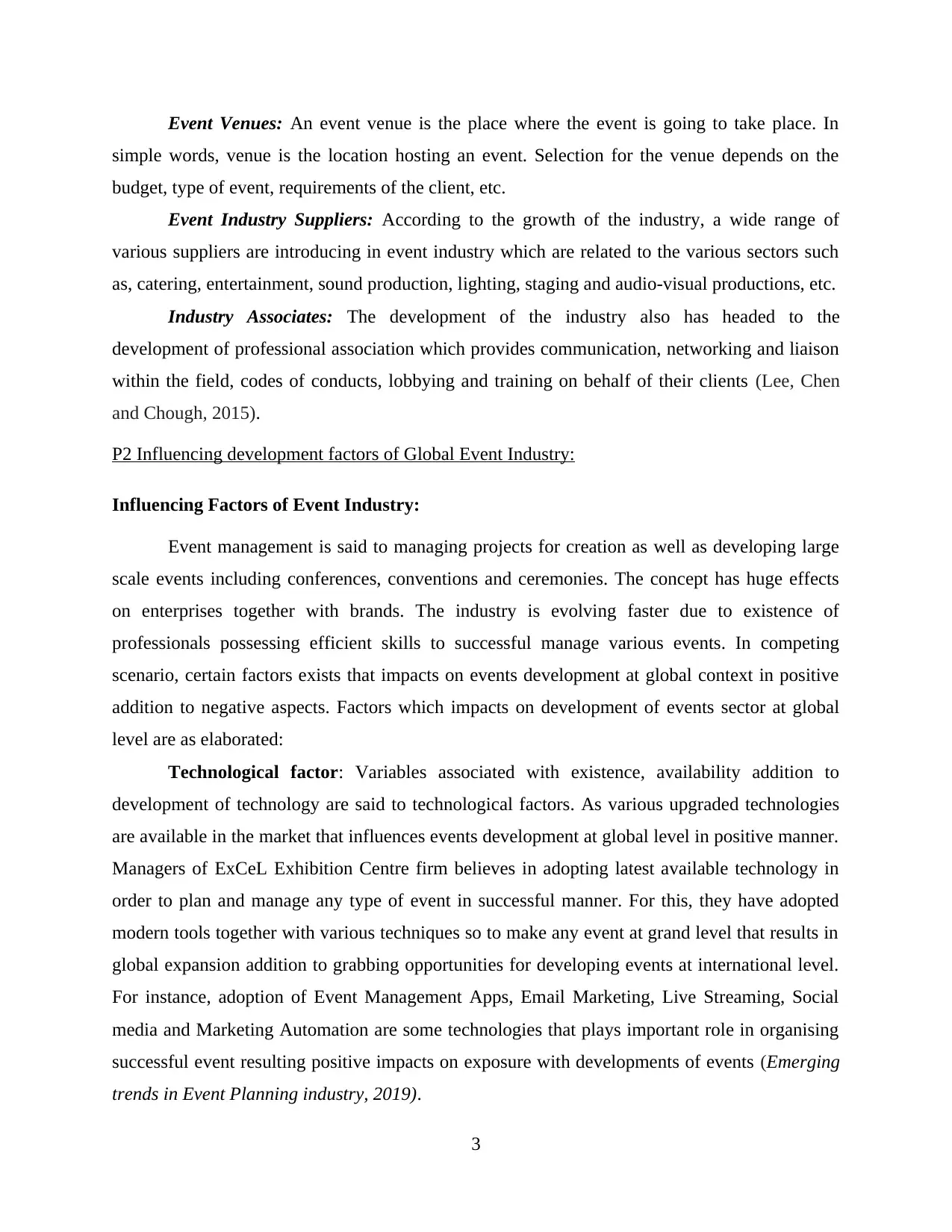
Event Venues: An event venue is the place where the event is going to take place. In
simple words, venue is the location hosting an event. Selection for the venue depends on the
budget, type of event, requirements of the client, etc.
Event Industry Suppliers: According to the growth of the industry, a wide range of
various suppliers are introducing in event industry which are related to the various sectors such
as, catering, entertainment, sound production, lighting, staging and audio-visual productions, etc.
Industry Associates: The development of the industry also has headed to the
development of professional association which provides communication, networking and liaison
within the field, codes of conducts, lobbying and training on behalf of their clients (Lee, Chen
and Chough, 2015).
P2 Influencing development factors of Global Event Industry:
Influencing Factors of Event Industry:
Event management is said to managing projects for creation as well as developing large
scale events including conferences, conventions and ceremonies. The concept has huge effects
on enterprises together with brands. The industry is evolving faster due to existence of
professionals possessing efficient skills to successful manage various events. In competing
scenario, certain factors exists that impacts on events development at global context in positive
addition to negative aspects. Factors which impacts on development of events sector at global
level are as elaborated:
Technological factor: Variables associated with existence, availability addition to
development of technology are said to technological factors. As various upgraded technologies
are available in the market that influences events development at global level in positive manner.
Managers of ExCeL Exhibition Centre firm believes in adopting latest available technology in
order to plan and manage any type of event in successful manner. For this, they have adopted
modern tools together with various techniques so to make any event at grand level that results in
global expansion addition to grabbing opportunities for developing events at international level.
For instance, adoption of Event Management Apps, Email Marketing, Live Streaming, Social
media and Marketing Automation are some technologies that plays important role in organising
successful event resulting positive impacts on exposure with developments of events (Emerging
trends in Event Planning industry, 2019).
3
simple words, venue is the location hosting an event. Selection for the venue depends on the
budget, type of event, requirements of the client, etc.
Event Industry Suppliers: According to the growth of the industry, a wide range of
various suppliers are introducing in event industry which are related to the various sectors such
as, catering, entertainment, sound production, lighting, staging and audio-visual productions, etc.
Industry Associates: The development of the industry also has headed to the
development of professional association which provides communication, networking and liaison
within the field, codes of conducts, lobbying and training on behalf of their clients (Lee, Chen
and Chough, 2015).
P2 Influencing development factors of Global Event Industry:
Influencing Factors of Event Industry:
Event management is said to managing projects for creation as well as developing large
scale events including conferences, conventions and ceremonies. The concept has huge effects
on enterprises together with brands. The industry is evolving faster due to existence of
professionals possessing efficient skills to successful manage various events. In competing
scenario, certain factors exists that impacts on events development at global context in positive
addition to negative aspects. Factors which impacts on development of events sector at global
level are as elaborated:
Technological factor: Variables associated with existence, availability addition to
development of technology are said to technological factors. As various upgraded technologies
are available in the market that influences events development at global level in positive manner.
Managers of ExCeL Exhibition Centre firm believes in adopting latest available technology in
order to plan and manage any type of event in successful manner. For this, they have adopted
modern tools together with various techniques so to make any event at grand level that results in
global expansion addition to grabbing opportunities for developing events at international level.
For instance, adoption of Event Management Apps, Email Marketing, Live Streaming, Social
media and Marketing Automation are some technologies that plays important role in organising
successful event resulting positive impacts on exposure with developments of events (Emerging
trends in Event Planning industry, 2019).
3
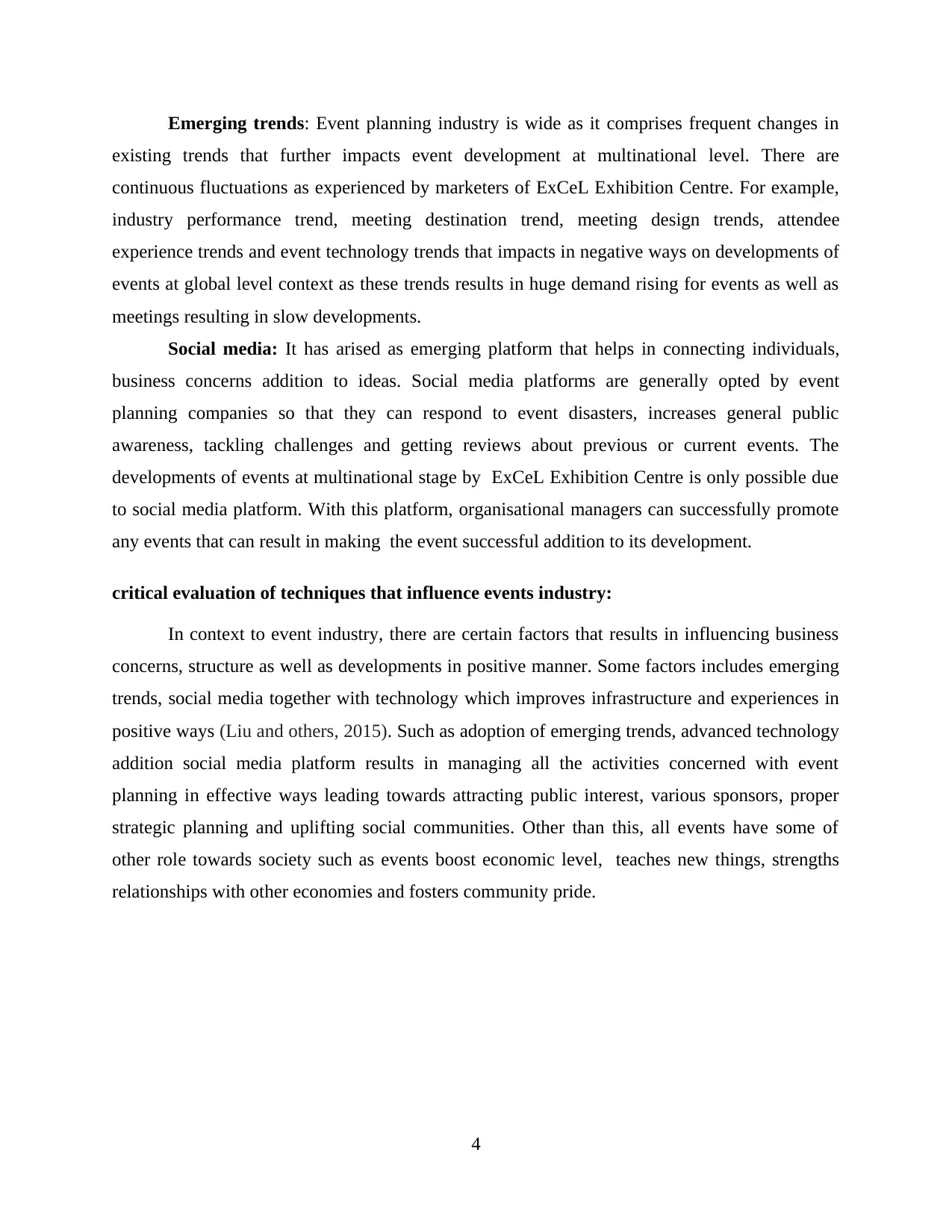
Emerging trends: Event planning industry is wide as it comprises frequent changes in
existing trends that further impacts event development at multinational level. There are
continuous fluctuations as experienced by marketers of ExCeL Exhibition Centre. For example,
industry performance trend, meeting destination trend, meeting design trends, attendee
experience trends and event technology trends that impacts in negative ways on developments of
events at global level context as these trends results in huge demand rising for events as well as
meetings resulting in slow developments.
Social media: It has arised as emerging platform that helps in connecting individuals,
business concerns addition to ideas. Social media platforms are generally opted by event
planning companies so that they can respond to event disasters, increases general public
awareness, tackling challenges and getting reviews about previous or current events. The
developments of events at multinational stage by ExCeL Exhibition Centre is only possible due
to social media platform. With this platform, organisational managers can successfully promote
any events that can result in making the event successful addition to its development.
critical evaluation of techniques that influence events industry:
In context to event industry, there are certain factors that results in influencing business
concerns, structure as well as developments in positive manner. Some factors includes emerging
trends, social media together with technology which improves infrastructure and experiences in
positive ways (Liu and others, 2015). Such as adoption of emerging trends, advanced technology
addition social media platform results in managing all the activities concerned with event
planning in effective ways leading towards attracting public interest, various sponsors, proper
strategic planning and uplifting social communities. Other than this, all events have some of
other role towards society such as events boost economic level, teaches new things, strengths
relationships with other economies and fosters community pride.
4
existing trends that further impacts event development at multinational level. There are
continuous fluctuations as experienced by marketers of ExCeL Exhibition Centre. For example,
industry performance trend, meeting destination trend, meeting design trends, attendee
experience trends and event technology trends that impacts in negative ways on developments of
events at global level context as these trends results in huge demand rising for events as well as
meetings resulting in slow developments.
Social media: It has arised as emerging platform that helps in connecting individuals,
business concerns addition to ideas. Social media platforms are generally opted by event
planning companies so that they can respond to event disasters, increases general public
awareness, tackling challenges and getting reviews about previous or current events. The
developments of events at multinational stage by ExCeL Exhibition Centre is only possible due
to social media platform. With this platform, organisational managers can successfully promote
any events that can result in making the event successful addition to its development.
critical evaluation of techniques that influence events industry:
In context to event industry, there are certain factors that results in influencing business
concerns, structure as well as developments in positive manner. Some factors includes emerging
trends, social media together with technology which improves infrastructure and experiences in
positive ways (Liu and others, 2015). Such as adoption of emerging trends, advanced technology
addition social media platform results in managing all the activities concerned with event
planning in effective ways leading towards attracting public interest, various sponsors, proper
strategic planning and uplifting social communities. Other than this, all events have some of
other role towards society such as events boost economic level, teaches new things, strengths
relationships with other economies and fosters community pride.
4
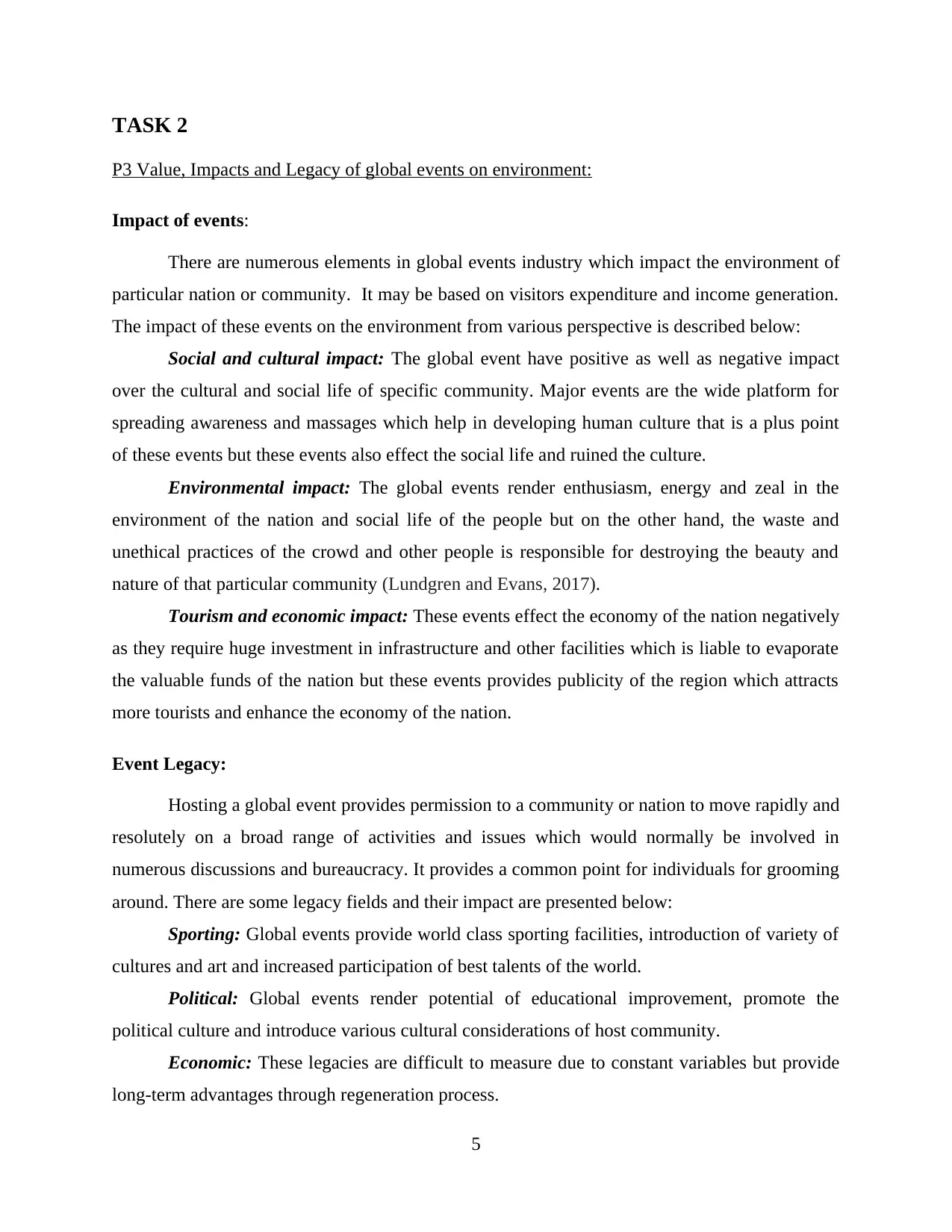
TASK 2
P3 Value, Impacts and Legacy of global events on environment:
Impact of events:
There are numerous elements in global events industry which impact the environment of
particular nation or community. It may be based on visitors expenditure and income generation.
The impact of these events on the environment from various perspective is described below:
Social and cultural impact: The global event have positive as well as negative impact
over the cultural and social life of specific community. Major events are the wide platform for
spreading awareness and massages which help in developing human culture that is a plus point
of these events but these events also effect the social life and ruined the culture.
Environmental impact: The global events render enthusiasm, energy and zeal in the
environment of the nation and social life of the people but on the other hand, the waste and
unethical practices of the crowd and other people is responsible for destroying the beauty and
nature of that particular community (Lundgren and Evans, 2017).
Tourism and economic impact: These events effect the economy of the nation negatively
as they require huge investment in infrastructure and other facilities which is liable to evaporate
the valuable funds of the nation but these events provides publicity of the region which attracts
more tourists and enhance the economy of the nation.
Event Legacy:
Hosting a global event provides permission to a community or nation to move rapidly and
resolutely on a broad range of activities and issues which would normally be involved in
numerous discussions and bureaucracy. It provides a common point for individuals for grooming
around. There are some legacy fields and their impact are presented below:
Sporting: Global events provide world class sporting facilities, introduction of variety of
cultures and art and increased participation of best talents of the world.
Political: Global events render potential of educational improvement, promote the
political culture and introduce various cultural considerations of host community.
Economic: These legacies are difficult to measure due to constant variables but provide
long-term advantages through regeneration process.
5
P3 Value, Impacts and Legacy of global events on environment:
Impact of events:
There are numerous elements in global events industry which impact the environment of
particular nation or community. It may be based on visitors expenditure and income generation.
The impact of these events on the environment from various perspective is described below:
Social and cultural impact: The global event have positive as well as negative impact
over the cultural and social life of specific community. Major events are the wide platform for
spreading awareness and massages which help in developing human culture that is a plus point
of these events but these events also effect the social life and ruined the culture.
Environmental impact: The global events render enthusiasm, energy and zeal in the
environment of the nation and social life of the people but on the other hand, the waste and
unethical practices of the crowd and other people is responsible for destroying the beauty and
nature of that particular community (Lundgren and Evans, 2017).
Tourism and economic impact: These events effect the economy of the nation negatively
as they require huge investment in infrastructure and other facilities which is liable to evaporate
the valuable funds of the nation but these events provides publicity of the region which attracts
more tourists and enhance the economy of the nation.
Event Legacy:
Hosting a global event provides permission to a community or nation to move rapidly and
resolutely on a broad range of activities and issues which would normally be involved in
numerous discussions and bureaucracy. It provides a common point for individuals for grooming
around. There are some legacy fields and their impact are presented below:
Sporting: Global events provide world class sporting facilities, introduction of variety of
cultures and art and increased participation of best talents of the world.
Political: Global events render potential of educational improvement, promote the
political culture and introduce various cultural considerations of host community.
Economic: These legacies are difficult to measure due to constant variables but provide
long-term advantages through regeneration process.
5
Paraphrase This Document
Need a fresh take? Get an instant paraphrase of this document with our AI Paraphraser
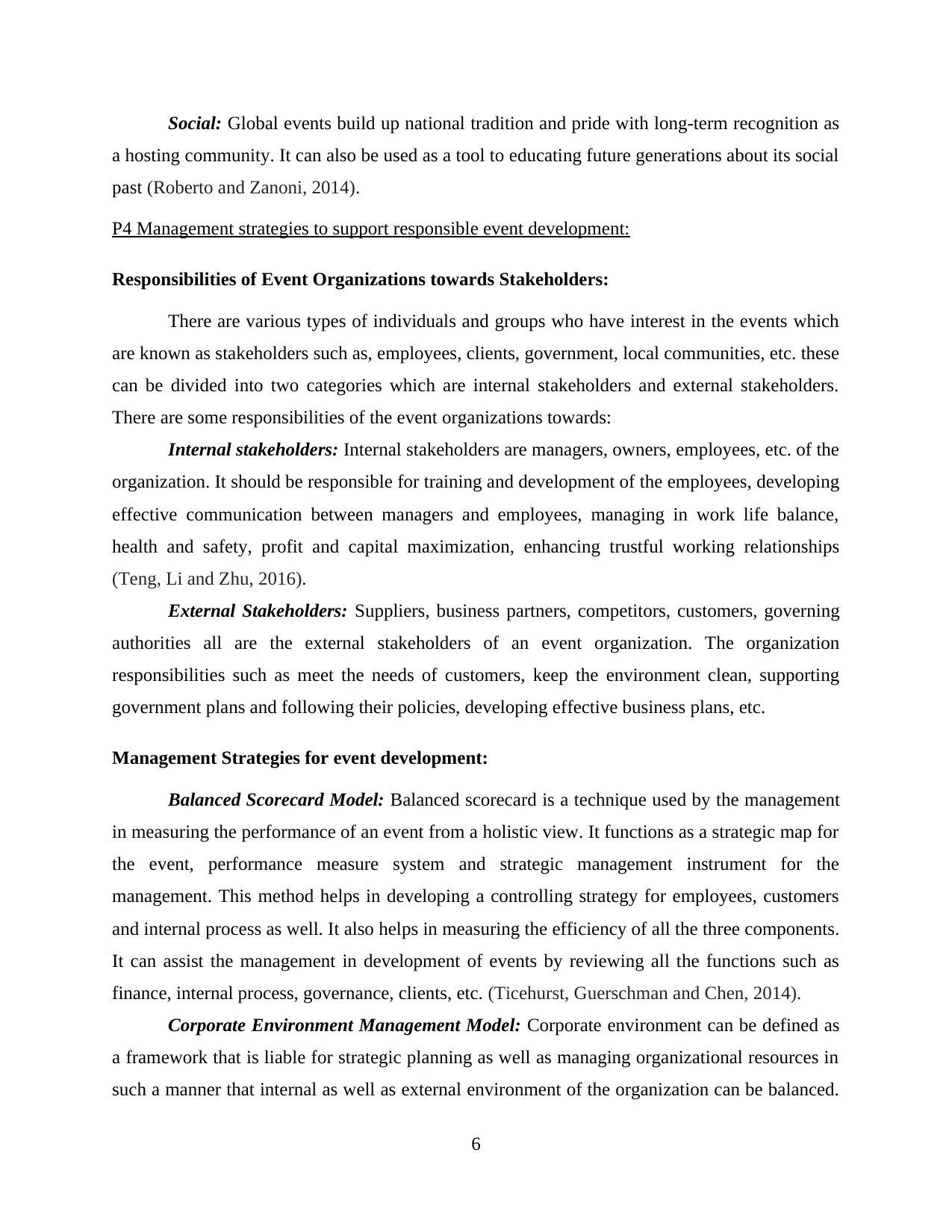
Social: Global events build up national tradition and pride with long-term recognition as
a hosting community. It can also be used as a tool to educating future generations about its social
past (Roberto and Zanoni, 2014).
P4 Management strategies to support responsible event development:
Responsibilities of Event Organizations towards Stakeholders:
There are various types of individuals and groups who have interest in the events which
are known as stakeholders such as, employees, clients, government, local communities, etc. these
can be divided into two categories which are internal stakeholders and external stakeholders.
There are some responsibilities of the event organizations towards:
Internal stakeholders: Internal stakeholders are managers, owners, employees, etc. of the
organization. It should be responsible for training and development of the employees, developing
effective communication between managers and employees, managing in work life balance,
health and safety, profit and capital maximization, enhancing trustful working relationships
(Teng, Li and Zhu, 2016).
External Stakeholders: Suppliers, business partners, competitors, customers, governing
authorities all are the external stakeholders of an event organization. The organization
responsibilities such as meet the needs of customers, keep the environment clean, supporting
government plans and following their policies, developing effective business plans, etc.
Management Strategies for event development:
Balanced Scorecard Model: Balanced scorecard is a technique used by the management
in measuring the performance of an event from a holistic view. It functions as a strategic map for
the event, performance measure system and strategic management instrument for the
management. This method helps in developing a controlling strategy for employees, customers
and internal process as well. It also helps in measuring the efficiency of all the three components.
It can assist the management in development of events by reviewing all the functions such as
finance, internal process, governance, clients, etc. (Ticehurst, Guerschman and Chen, 2014).
Corporate Environment Management Model: Corporate environment can be defined as
a framework that is liable for strategic planning as well as managing organizational resources in
such a manner that internal as well as external environment of the organization can be balanced.
6
a hosting community. It can also be used as a tool to educating future generations about its social
past (Roberto and Zanoni, 2014).
P4 Management strategies to support responsible event development:
Responsibilities of Event Organizations towards Stakeholders:
There are various types of individuals and groups who have interest in the events which
are known as stakeholders such as, employees, clients, government, local communities, etc. these
can be divided into two categories which are internal stakeholders and external stakeholders.
There are some responsibilities of the event organizations towards:
Internal stakeholders: Internal stakeholders are managers, owners, employees, etc. of the
organization. It should be responsible for training and development of the employees, developing
effective communication between managers and employees, managing in work life balance,
health and safety, profit and capital maximization, enhancing trustful working relationships
(Teng, Li and Zhu, 2016).
External Stakeholders: Suppliers, business partners, competitors, customers, governing
authorities all are the external stakeholders of an event organization. The organization
responsibilities such as meet the needs of customers, keep the environment clean, supporting
government plans and following their policies, developing effective business plans, etc.
Management Strategies for event development:
Balanced Scorecard Model: Balanced scorecard is a technique used by the management
in measuring the performance of an event from a holistic view. It functions as a strategic map for
the event, performance measure system and strategic management instrument for the
management. This method helps in developing a controlling strategy for employees, customers
and internal process as well. It also helps in measuring the efficiency of all the three components.
It can assist the management in development of events by reviewing all the functions such as
finance, internal process, governance, clients, etc. (Ticehurst, Guerschman and Chen, 2014).
Corporate Environment Management Model: Corporate environment can be defined as
a framework that is liable for strategic planning as well as managing organizational resources in
such a manner that internal as well as external environment of the organization can be balanced.
6
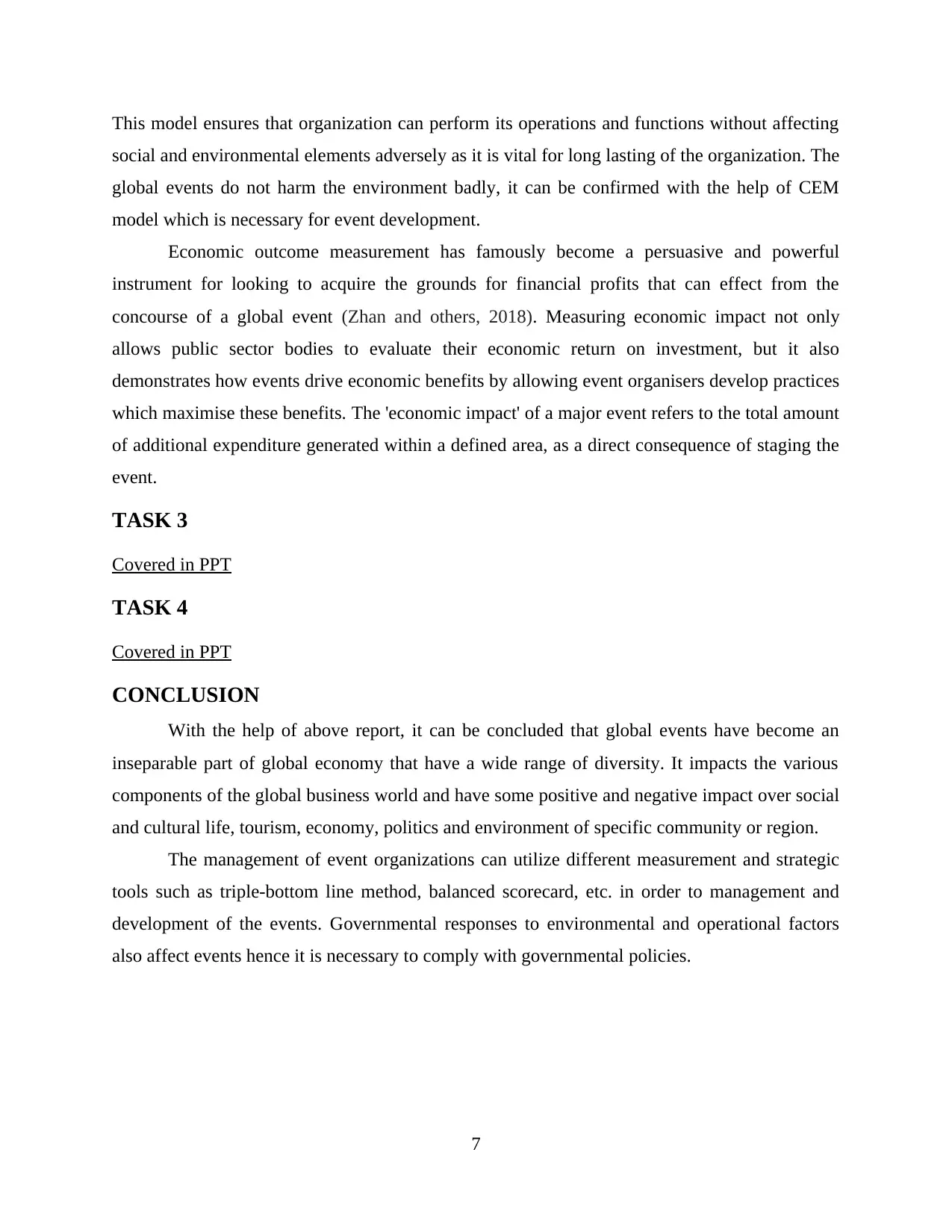
This model ensures that organization can perform its operations and functions without affecting
social and environmental elements adversely as it is vital for long lasting of the organization. The
global events do not harm the environment badly, it can be confirmed with the help of CEM
model which is necessary for event development.
Economic outcome measurement has famously become a persuasive and powerful
instrument for looking to acquire the grounds for financial profits that can effect from the
concourse of a global event (Zhan and others, 2018). Measuring economic impact not only
allows public sector bodies to evaluate their economic return on investment, but it also
demonstrates how events drive economic benefits by allowing event organisers develop practices
which maximise these benefits. The 'economic impact' of a major event refers to the total amount
of additional expenditure generated within a defined area, as a direct consequence of staging the
event.
TASK 3
Covered in PPT
TASK 4
Covered in PPT
CONCLUSION
With the help of above report, it can be concluded that global events have become an
inseparable part of global economy that have a wide range of diversity. It impacts the various
components of the global business world and have some positive and negative impact over social
and cultural life, tourism, economy, politics and environment of specific community or region.
The management of event organizations can utilize different measurement and strategic
tools such as triple-bottom line method, balanced scorecard, etc. in order to management and
development of the events. Governmental responses to environmental and operational factors
also affect events hence it is necessary to comply with governmental policies.
7
social and environmental elements adversely as it is vital for long lasting of the organization. The
global events do not harm the environment badly, it can be confirmed with the help of CEM
model which is necessary for event development.
Economic outcome measurement has famously become a persuasive and powerful
instrument for looking to acquire the grounds for financial profits that can effect from the
concourse of a global event (Zhan and others, 2018). Measuring economic impact not only
allows public sector bodies to evaluate their economic return on investment, but it also
demonstrates how events drive economic benefits by allowing event organisers develop practices
which maximise these benefits. The 'economic impact' of a major event refers to the total amount
of additional expenditure generated within a defined area, as a direct consequence of staging the
event.
TASK 3
Covered in PPT
TASK 4
Covered in PPT
CONCLUSION
With the help of above report, it can be concluded that global events have become an
inseparable part of global economy that have a wide range of diversity. It impacts the various
components of the global business world and have some positive and negative impact over social
and cultural life, tourism, economy, politics and environment of specific community or region.
The management of event organizations can utilize different measurement and strategic
tools such as triple-bottom line method, balanced scorecard, etc. in order to management and
development of the events. Governmental responses to environmental and operational factors
also affect events hence it is necessary to comply with governmental policies.
7
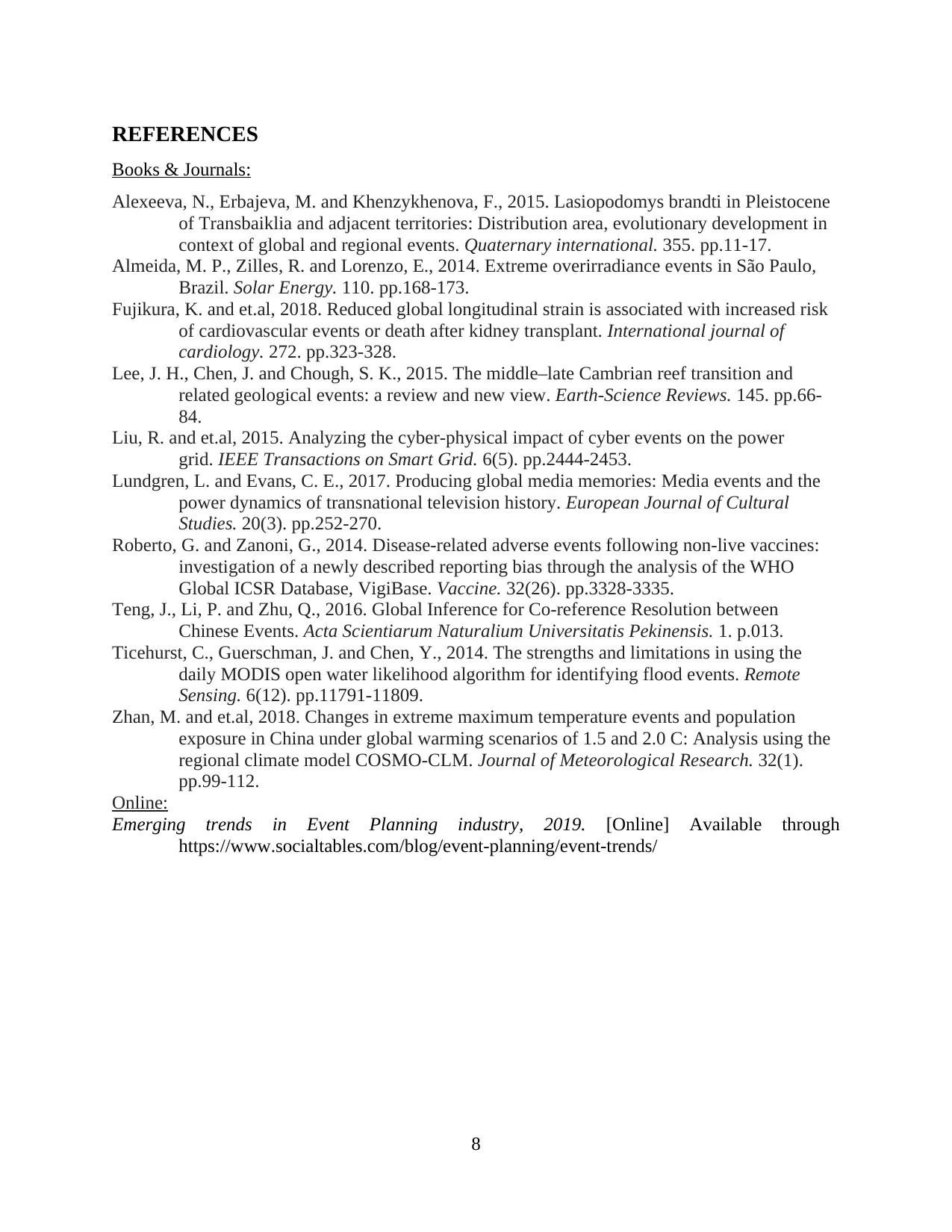
REFERENCES
Books & Journals:
Alexeeva, N., Erbajeva, M. and Khenzykhenova, F., 2015. Lasiopodomys brandti in Pleistocene
of Transbaiklia and adjacent territories: Distribution area, evolutionary development in
context of global and regional events. Quaternary international. 355. pp.11-17.
Almeida, M. P., Zilles, R. and Lorenzo, E., 2014. Extreme overirradiance events in São Paulo,
Brazil. Solar Energy. 110. pp.168-173.
Fujikura, K. and et.al, 2018. Reduced global longitudinal strain is associated with increased risk
of cardiovascular events or death after kidney transplant. International journal of
cardiology. 272. pp.323-328.
Lee, J. H., Chen, J. and Chough, S. K., 2015. The middle–late Cambrian reef transition and
related geological events: a review and new view. Earth-Science Reviews. 145. pp.66-
84.
Liu, R. and et.al, 2015. Analyzing the cyber-physical impact of cyber events on the power
grid. IEEE Transactions on Smart Grid. 6(5). pp.2444-2453.
Lundgren, L. and Evans, C. E., 2017. Producing global media memories: Media events and the
power dynamics of transnational television history. European Journal of Cultural
Studies. 20(3). pp.252-270.
Roberto, G. and Zanoni, G., 2014. Disease-related adverse events following non-live vaccines:
investigation of a newly described reporting bias through the analysis of the WHO
Global ICSR Database, VigiBase. Vaccine. 32(26). pp.3328-3335.
Teng, J., Li, P. and Zhu, Q., 2016. Global Inference for Co-reference Resolution between
Chinese Events. Acta Scientiarum Naturalium Universitatis Pekinensis. 1. p.013.
Ticehurst, C., Guerschman, J. and Chen, Y., 2014. The strengths and limitations in using the
daily MODIS open water likelihood algorithm for identifying flood events. Remote
Sensing. 6(12). pp.11791-11809.
Zhan, M. and et.al, 2018. Changes in extreme maximum temperature events and population
exposure in China under global warming scenarios of 1.5 and 2.0 C: Analysis using the
regional climate model COSMO-CLM. Journal of Meteorological Research. 32(1).
pp.99-112.
Online:
Emerging trends in Event Planning industry, 2019. [Online] Available through
https://www.socialtables.com/blog/event-planning/event-trends/
8
Books & Journals:
Alexeeva, N., Erbajeva, M. and Khenzykhenova, F., 2015. Lasiopodomys brandti in Pleistocene
of Transbaiklia and adjacent territories: Distribution area, evolutionary development in
context of global and regional events. Quaternary international. 355. pp.11-17.
Almeida, M. P., Zilles, R. and Lorenzo, E., 2014. Extreme overirradiance events in São Paulo,
Brazil. Solar Energy. 110. pp.168-173.
Fujikura, K. and et.al, 2018. Reduced global longitudinal strain is associated with increased risk
of cardiovascular events or death after kidney transplant. International journal of
cardiology. 272. pp.323-328.
Lee, J. H., Chen, J. and Chough, S. K., 2015. The middle–late Cambrian reef transition and
related geological events: a review and new view. Earth-Science Reviews. 145. pp.66-
84.
Liu, R. and et.al, 2015. Analyzing the cyber-physical impact of cyber events on the power
grid. IEEE Transactions on Smart Grid. 6(5). pp.2444-2453.
Lundgren, L. and Evans, C. E., 2017. Producing global media memories: Media events and the
power dynamics of transnational television history. European Journal of Cultural
Studies. 20(3). pp.252-270.
Roberto, G. and Zanoni, G., 2014. Disease-related adverse events following non-live vaccines:
investigation of a newly described reporting bias through the analysis of the WHO
Global ICSR Database, VigiBase. Vaccine. 32(26). pp.3328-3335.
Teng, J., Li, P. and Zhu, Q., 2016. Global Inference for Co-reference Resolution between
Chinese Events. Acta Scientiarum Naturalium Universitatis Pekinensis. 1. p.013.
Ticehurst, C., Guerschman, J. and Chen, Y., 2014. The strengths and limitations in using the
daily MODIS open water likelihood algorithm for identifying flood events. Remote
Sensing. 6(12). pp.11791-11809.
Zhan, M. and et.al, 2018. Changes in extreme maximum temperature events and population
exposure in China under global warming scenarios of 1.5 and 2.0 C: Analysis using the
regional climate model COSMO-CLM. Journal of Meteorological Research. 32(1).
pp.99-112.
Online:
Emerging trends in Event Planning industry, 2019. [Online] Available through
https://www.socialtables.com/blog/event-planning/event-trends/
8
1 out of 10
Related Documents
Your All-in-One AI-Powered Toolkit for Academic Success.
+13062052269
info@desklib.com
Available 24*7 on WhatsApp / Email
![[object Object]](/_next/static/media/star-bottom.7253800d.svg)
Unlock your academic potential
© 2024 | Zucol Services PVT LTD | All rights reserved.





